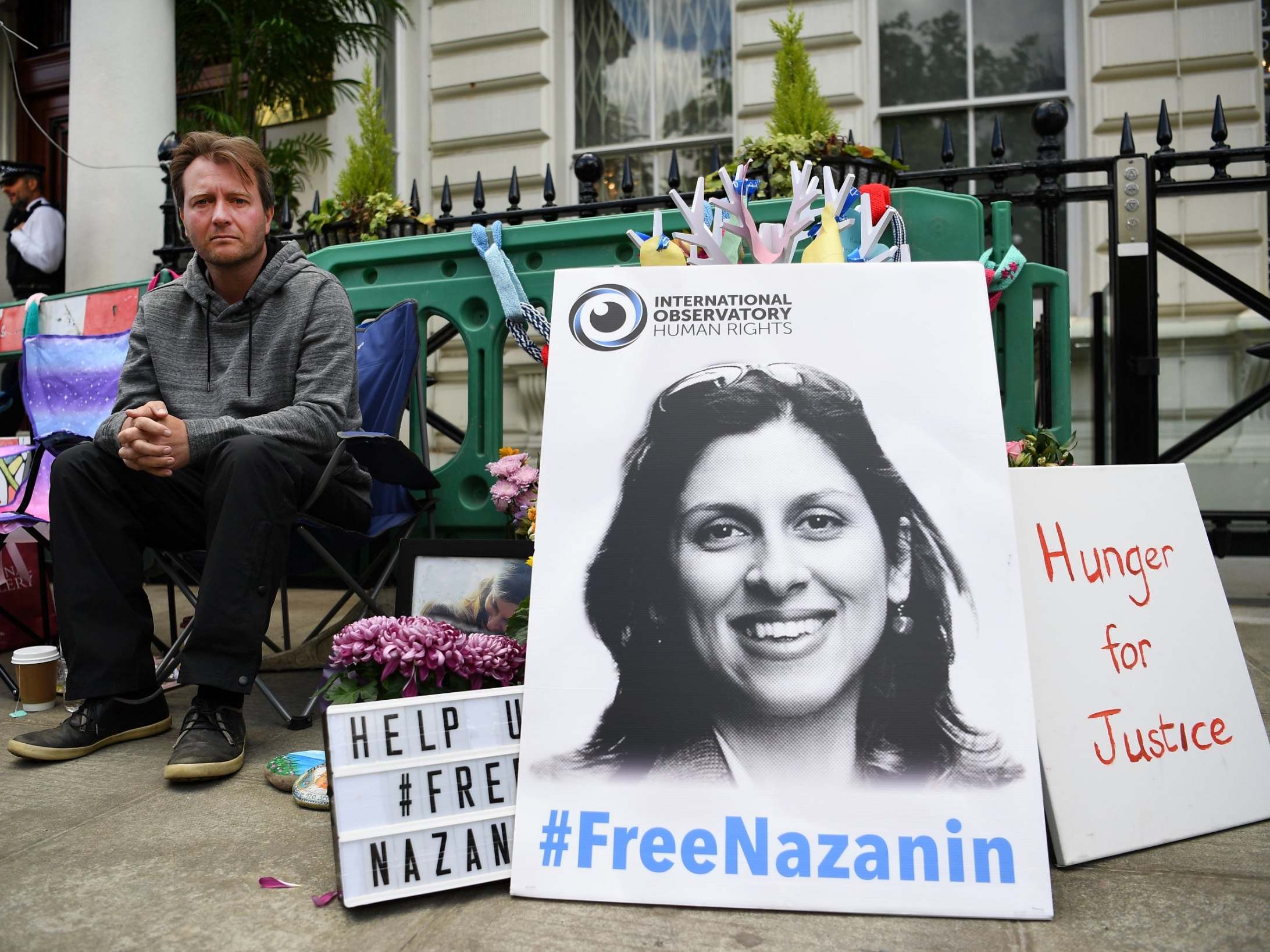'We are on a precipice': Family fears for Nazanin Zaghari-Ratcliffe after she makes devastating decision to send daughter home
‘I am a desolate mother ready to burn like a desert dune,’ the British charity worker writes, after revealing her five-year-old will return to the UK for school
The husband of a British charity worker jailed in Iran has warned his wife is on “a precipice” and at risk of suicide, after making the decision to send her daughter home to London for school, depriving her of weekly visits.
The only communication Nazanin Zaghari-Ratcliffe, 40, will have with her daughter Gabriella, five, once she returns to the UK, is five-minute phone calls if and when prison guards permit it. Gabriella was 22-months-old when her mother was arrested by Iran’s infamous Revolutionary Guards at Tehran airport in April 2016 while they were both on holiday in the country.
When Ms Zaghari-Ratcliffe was sentenced to five years in jail on spying charges, Gabriella remained in Iran, visiting her mother in prison once a week for the last few years. The Iranian-British dual national, who has staged several hunger strikes, had hoped to return home with her daughter. But with little movement in her case, she was forced to make the agonising choice of letting her daughter go home for school.
Ms Zaghari-Ratcliffe released a heartfelt plea for her freedom from jail on Thursday saying: “I am a desolate mother ready to burn like a desert dune”.
Mr Ratcliffe, who has not seen either his wife or daughter since the spring of 2016, said he feared for his wife as Gabriella “is her lifeline”.
“We are all on a precipice. It is bleak, she cannot go on much longer. Her reserves of hope are depleting,” he told The Independent. “We fear she will take things into her own hands. If we are lucky it will be a more militant hunger strike, if not she may attempt suicide.”
He said he was concerned that Gabriella will find it hard to re-adjust to life in the UK. Mr Ratcliffe is unable to speak to his daughter without a translator as she has been in Iran for so long.
“She doesn’t really know her daddy that well anymore, she doesn’t really know London. She can’t speak English,” he continued.
“We have been separated for so long. I’m a rusty parent”.
He urged the government to act fast.
“The Foreign Office needs to be more assertive with Iran on these cases, there needs to be a cost for hostage-taking,” he said.
Ms Zaghari-Ratcliffe, who worked for the Thomson Reuters Foundation, the charitable arm of the news agency, was visiting her parents in Tehran when she was arrested while trying to board a plane home. She was held for months in solitary confinement and later sentenced to five years in jail on espionage charges, after a short trial panned by human rights groups as unjust.
Her family believes she is being held as political leverage in a dispute between Iran and the British government. Over the summer, she went on another hunger strike in protest of her continued detention.
The Iranian authorities responded by chaining her to a bed in a psychiatric unit and briefly banning phone calls to her husband or visits from her daughter. With little hope of a speedy release, she eventually decided to send her daughter back to London.
In a letter smuggled out of her jail cell and addressed to “the mothers of Iran”, she wrote that separation from her daughter is the “deepest torture of them all”.
“I have no hope or motivation after my baby goes. There is no measure to my pain,” she said.
“It is such a bitter feeling to know you are stuck unjustly in prison in your own country, with no road to freedom ahead. I am a desolate mother ready to burn like a desert dune when her baby leaves.”
She is one of dozens of dual nationals who are currently behind bars in Tehran’s infamous Evin Prison. In August, Iranian judicial officials reported that Anousheh Ashouri, a British-Iranian dual national, was sentenced to 10 years in prison, again on spying charges.

A few weeks later, the Iranians arrested two British-Australian women, Kylie Moore-Gilbert, a Middle East politics specialist at Melbourne University, and travel blogger Jolie King, together with Mark Firkin, an Australian man – on unknown charges.
In July, more than 200 MPs called for Boris Johnson to use his powers to secure Mrs Zaghari-Ratcliffe’s safe release from Iran. He is under pressure to secure her release after inadvertently worsening her situation when in 2017 he said she was in Iran “teaching people journalism”.
The regime used his statement as “proof” of the charges against her. The family insisted she was on holiday when she was arrested. The government later clarified that there was “no doubt” this was the case.
Join our commenting forum
Join thought-provoking conversations, follow other Independent readers and see their replies
Comments
Bookmark popover
Removed from bookmarks